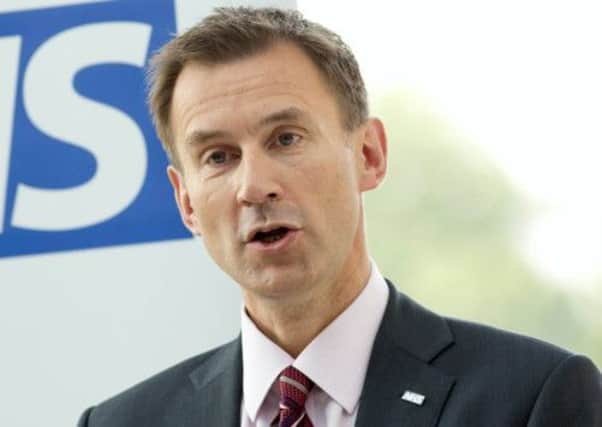Injection of £250m to shore up NHS services


The move follows a dramatic worsening in A&E performance last winter blamed on growing pressures across the NHS.
He gave details of how £250m in extra cash would be spent on measures to improve care for vulnerable older people and alleviate pressures on the most “at risk” A&E units in the country.
Advertisement
Hide AdAdvertisement
Hide AdIn Yorkshire, York NHS trust, which runs casualty services in York and Scarborough, has been handed £2.1m, hospitals in Leeds have been given £1.9m, a further £1.5m has been given to the Airedale NHS trust, near Keighley, and £1m has been channelled to the Northern Lincolnshire and Goole NHS trust, which has been put into “special measures” owing to failings in services including emergency care.
Less than 10 per cent of the cash is being given to just 12 NHS trusts in the North of England, with half being handed to 22 NHS trusts in London and the South and the remainder to 19 in the Midlands and East Anglia. A further £15m is going towards improving the much-criticised NHS 111 helpline.
Mr Hunt said another £250m would be available next year but those receiving the money now would only be eligible if they ensured 75 per cent of their staff were vaccinated against flu.
He also announced that children aged two and three will be vaccinated against flu for the first time.
Advertisement
Hide AdAdvertisement
Hide AdThe NHS will also be launching a campaign to help prevent flu from impacting services. The move is in stark contrast to the coalition’s first year when it axed the national flu campaign.
The fund will help NHS trusts provide extra consultant care, improve care for those with long-term conditions, enhance end-of-life care and provide better community care with additional district nurses.
Mr Hunt said: “This winter is going to be tough –- that’s why the Government is acting now to make sure patients receive a great, safe service, even with the added pressures the cold weather brings.
“But this is a serious, long-term problem which needs fundamental changes to equip our A&Es for the future. In the long term I want a 24/7 service which recognises patients as individuals and looks out for them proactively.”
Advertisement
Hide AdAdvertisement
Hide AdIn coming years, he said he wanted patients to have a named clinician responsible for their care across all health services, likely to be their GP. By the end of next year he wanted at least a third of A&Es and 111 call-handlers to be able to see the GP records of their patients
Care Minister Norman Lamb said in the long-term A&E departments needed a more co-ordinated approach across the NHS to relieve mounting pressures.
“We have a crisis occurring which could have been avoided,” he said. “The system is dysfunctional because it is not joined-up.”
Peter Carter, chief executive of the Royal College of Nursing, said: “Our recent survey of nurses working in A&E demonstrates the level of concern that staff have over the care they can provide for their patients if the current pressures continue.
Advertisement
Hide AdAdvertisement
Hide Ad“However, the pressures on A&E are symptomatic of wider problems across the system and we hope today’s announcement indicates investment in a longer-term approach to solving these problems.”
Paul Flynn, chairman of the British Medical Association’s consultant committee, said: “The bottom line is that if A&Es are to deal with the extra pressures facing them they need significant, rather than one-off, additional investment in staff and resources, while also ensuring only those in need of emergency care are presenting at A&E.”
Mark Smith, chief operating officer at the Leeds NHS trust, said: “Our winter plans are far more advanced than they have ever been by this stage before.
“The money is a very welcome investment but it alone will not make for a successful winter. Preparing ourselves with our colleagues in the city and building better internal systems are also essential.”
Advertisement
Hide AdAdvertisement
Hide AdStacey Hunter, director of operations at Airedale, welcomed the investment ahead of what was recognised as a “challenging winter”. She said: “Our priorities include ensuring appropriate care for our frail, vulnerable patients and wherever possible preventing unnecessary admissions to hospital, enabling patients to go home earlier and providing more care closer to home.”